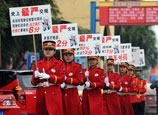
Massive demand
Although illegal, there is still a massive demand for black taxis in Beijing, particularly on the rural-urban fringes where there are large communities of migrant workers and public transport is scarce.
"Licensed cab drivers sometimes refuse to pick up passengers downtown if they're going to rural areas, especially on rainy days," one black-taxi driver told China Daily as he drove from Sanlitun to Wudaokou.
"I'm always willing to do business, although some passengers are too afraid to get in my car."
The driver, who did not want to be named, said he is from Heilongjiang province and did not want to break the law. However, like many migrants, he is barred from applying for a taxi license under city regulations, which requires all drivers to have Beijing hukou, a permanent residency permit.
Meanwhile, a genuine cabbie who gave his name as Shen said many black-taxi drivers are former license holders looking to boost their incomes.
"I pay my company more than 6,000 yuan a month (in rent), so I can only earn a little," he said. "That's why some drivers give up their jobs and turn to illegal operation."
Despite the argument made by many that black taxis fill a gap in the public transport system, legal experts largely agree they are bad for the capital.
Zhao Li, a criminal attorney with Beijing King and Bond Law Firm, said that if the supply of black taxis cannot be quickly cut, the authorities should increase the penalties for those caught behind the wheel of a black taxi.
At the moment, the maximum penalty is five years in prison and a fine.
"That is just not harsh enough, which is why so many people still go back to operating an illegal taxi even after they have been punished," he said.















 Busiest line in Beijing: Subway line 10 has reached a daily transportation of 1 million passengers on average
Busiest line in Beijing: Subway line 10 has reached a daily transportation of 1 million passengers on average


![]()
